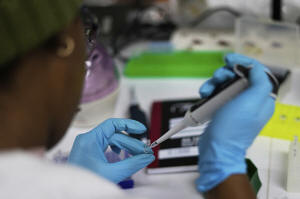US aid cuts halt HIV vaccine research in South Africa, with global
impact
[July 14, 2025]
By MOGOMOTSI MAGOME
JOHANNESBURG (AP) — Just a week had remained before scientists in South
Africa were to begin clinical trials of an HIV vaccine, and hopes were
high for another step toward limiting one of history's deadliest
pandemics. Then the email arrived.
Stop all work, it said. The United States under the Trump administration
was withdrawing all its funding.
The news devastated the researchers, who live and work in a region where
more people live with HIV than anywhere else in the world. Their
research project, called BRILLIANT, was meant to be the latest to draw
on the region's genetic diversity and deep expertise in the hope of
benefiting people everywhere.
But the $46 million from the U.S. for the project was disappearing, part
of the dismantling of foreign aid by the world's biggest donor earlier
this year as President Donald Trump announced a focus on priorities at
home.
South Africa hit hard by aid cuts
South Africa has been hit especially hard because of Trump's baseless
claims about the targeting of the country's white Afrikaner minority.
The country had been receiving about $400 million a year via USAID and
the HIV-focused PEPFAR.
Now that's gone.
Glenda Grey, who heads the Brilliant program, said the African continent
has been vital to the development of HIV medication, and the U.S. cuts
threaten its capability to do such work in the future.

Significant advances have included clinical trials for lenacapavir, the
world’s only twice-a-year shot to prevent HIV, recently approved for use
by the U.S. Food and Drug Administration. One study to show its efficacy
involved young South Africans.
“We do the trials better, faster and cheaper than anywhere else in the
world, and so without South Africa as part of these programs, the world,
in my opinion, is much poorer,” Gray said.
She noted that during the urgency of the COVID-19 pandemic, South Africa
played a crucial role by testing the Johnson & Johnson and Novavax
vaccines, and South African scientists' genomic surveillance led to the
identification of an important variant.
Labs empty and thousands are laid off
A team of researchers at the University of the Witwatersrand has been
part of the unit developing the HIV vaccines for the trials.
Inside the Wits laboratory, technician Nozipho Mlotshwa was among the
young people in white gowns working on samples, but she may soon be out
of a job.
Her position is grant-funded. She uses her salary to support her family
and fund her studies in a country where youth unemployment hovers around
46%.
“It’s very sad and devastating, honestly," she said of the U.S. cuts and
overall uncertainty. “We’ll also miss out collaborating with other
scientists across the continent.”
[to top of second column]
|

A laboratory technician Nozipho Mlotshwa works on samples at the
Wits laboratory Antiviral Gene Therapy Research Unit, at University
of the Witwatersrand Medical School, in Johannesburg, South Africa,
Thursday, May 22, 2025. (AP Photo/Themba Hadebe)
 Professor Abdullah Ely leads the
team of researchers. He said the work had promising results
indicating that the vaccines were producing an immune response.
But now that momentum, he said, has “all kind of had to come to a
halt.”
The BRILLIANT program is scrambling to find money to save the
project. The purchase of key equipment has stopped. South Africa's
health department says about 100 researchers for that program and
others related to HIV have been laid off. Funding for postdoctoral
students involved in experiments for the projects is at risk.
South Africa's government has estimated that universities and
science councils could lose about $107 million in U.S. research
funding over the next five years due to the aid cuts, which affect
not only work on HIV but also tuberculosis — another disease with a
high number of cases in the country.
Less money, and less data on what's affected
South Africa’s government has said it will be very difficult to find
funding to replace the U.S. support.
And now the number of HIV infections will grow. Medication is more
difficult to obtain. At least 8,000 health workers in South Africa's
HIV program have already been laid off, the government has said.
Also gone are the data collectors who tracked patients and their
care, as well as HIV counselors who could reach vulnerable patients
in rural communities.
For researchers, Universities South Africa, an umbrella body, has
applied to the national treasury for over $110 million for projects
at some of the largest schools.
During a visit to South Africa in June, UNAIDS executive director
Winnie Byanyima was well aware of the stakes, and the lives at risk,
as research and health care struggle in South Africa and across
Africa at large.

Other countries that were highly dependent on U.S. funding including
Zambia, Nigeria, Burundi and Ivory Coast are already increasing
their own resources, she said.
“But let’s be clear, what they are putting down will not be funding
in the same way that the American resources were funding," Byanyima
said.
___
Associated Press writer Michelle Gumede in Johannesburg contributed
to this report.
All contents © copyright 2025 Associated Press. All rights reserved |